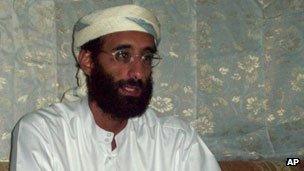Inspire magazine: Who was behind it?
- Published

Inspire had a glossy look
A 27-year-old New Yorker, arrrested on suspicion of planning a bombing campaign on US soil, was believed to have been influenced by an al-Qaeda magazine called Inspire, say police. So who was behind this publication?
Anwar al-Awlaki may be dead but the arrest of Jose Pimentel shows the influence of one of the most dangerous figures in al-Qaeda has extended even beyond the grave, particularly though Inspire magazine, the "glossy" online publication which served to radicalise and operationalise lone-wolf terrorists.
According to New York authorities, Mr Pimentel was not just radicalised by the al-Qaeda magazine but also found in its pages the instructions he used to build pipe bombs, thanks to a notorious article entitled "How to make a bomb in the kitchen of your mom".
The magazine, which coincidentally shares its name with a Christian magazine of a very different tone, disappeared from the internet earlier this year due to "issues with its content", according to a message on the now defunct website. It aimed to encourage and help Muslims in the West to carry out acts of violence.
Its articles glorified al-Qaeda, provided justifications for the use of violence and practical advice on how to carry out such acts - all presented in an appealing form that, in terms of production values, rivalled anything you would find in a regular magazine found on a news stand.
Awlaki's understanding of modern media made Osama Bin Laden look positively old-fashioned. In the past, al-Qaeda affiliates would have had reach into the West typically through diasporas and personal ties, but Awlaki provided it through the new means of modern communications.
For instance, he gave the Fort Hood shooter Major Nidal Hasan advice by email. Meanwhile, his teachings are believed to have influenced Roshonara Choudhry who stabbed Stephen Timms MP in the UK (although here there is less evidence of direct contact).
Faisal Shahzad, who tried to detonate a car bomb in Times Square, was also said to be inspired by him while a British Airways staff member in the UK was in touch with Awlaki directly by email (and was convicted earlier this year).
This was all part of a wider trend in which al-Qaeda as a whole seemed unable to carry out major attacks in the nature of 9/11 and so instead focused on trying to encourage individuals in the West to go it alone and carry out their own attacks, sometimes with training and direction and sometimes entirely independently.
Such lone wolves are a growing headache for western security services since they can be harder to spot. However, they tend to have less capability than groups which have been trained in person by al-Qaeda in Pakistan or elsewhere.
Gibberish
There has been a debate within western intelligence circles about how best to combat the appeal of Inspire.
Some favoured using cyber techniques to target the magazine's publication and prevent people reading its content.
Britain's eavesdropping and cyber intelligence agency GCHQ is believed to have used such techniques to target the first issue in June 2010, including the article "Make a Bomb in the Kitchen of your Mom".
It has been claimed that GCHQ was responsible for temporarily substituting the original text of the magazine with what looked to be gibberish (although the gibberish supposedly contained code for making cupcakes in a kitchen rather than bombs).
In Washington, there is believed to have been more unease with targeting the actual publication itself - some believing it set a dangerous precedent, others believing that it was better to maintain access to use as an intelligence gathering tool, tracking those who downloaded it.
Although Awlaki provided the public face for Inspire, the key individual in actually producing it was believed to have been Samir Khan.

Al-Awlaki is believed to have been behind Inspire
Khan was an American who had grown up in New York and his media skills made him the key player in turning Inspire into such a glossy magazine. He was killed in the same strike as Awlaki in late September.
Awlaki's death appears to have acted as a spur to Pimentel to speed up his plans. He had begun planning a bomb in August but surveillance revealed that he began to accelerate his plans after a drone strike killed the al-Qaeda leader.
Awlaki and Khan are in many ways irreplaceable. The hope will be that their influence - along with that of Inspire - diminishes over time but this latest plot shows that for the moment it still remains real.
- Published21 November 2011
- Published19 April 2011
- Published1 October 2011